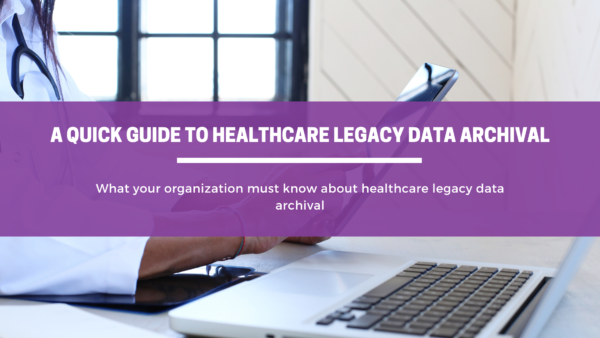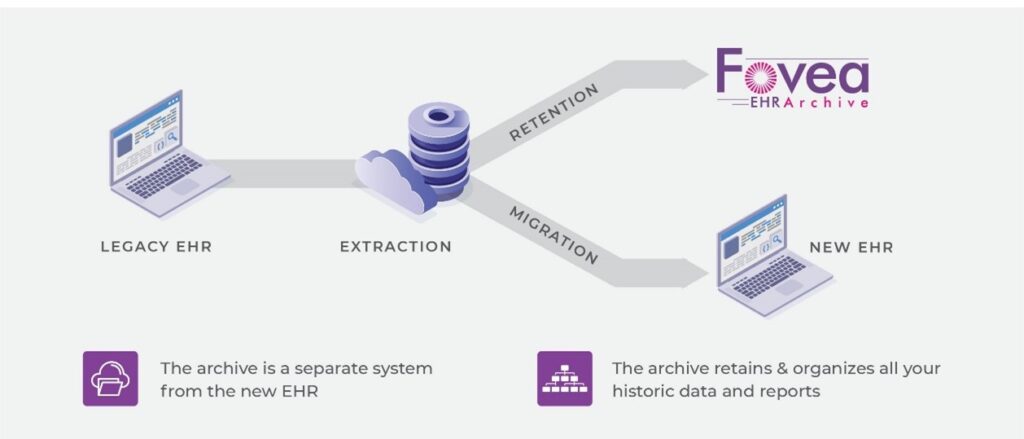Healthcare legacy data archival plays a major role for healthcare organizations in terms of operational workflow, data lifecycle management, business revenue, and patient care. It is a game-changer for them as it can positively impact the healthcare facility, its staff, and patients.
In this article, we’ll cover:
- What is healthcare legacy data archival?
- What is the process for healthcare legacy data archival?
- Why is it important for healthcare organizations to archive?
It will also help provide a clear picture to your healthcare organization on how to get started with legacy data archiving.
What is Healthcare Legacy Data Archival?
Healthcare legacy data archival is the process of moving inactive health records from legacy systems containing various healthcare data to a long-term storage solution. The legacy data is stored in an archival application, where it can be easily searched and readily accessed, whenever required by healthcare providers, staff, and users for continuity of care, the release of information, as well as for billing and business workflows.
There are several mediums to store archived legacy data – offline mediums such as tapes, discs, hard drives (HDDs), flash storage, and optical storage, or an online medium such as a cloud-based archive. The best medium can be determined only based on the data volume and type of datasets to be archived.
For healthcare organizations that store various types of and large amounts of health information, for a long term in their legacy systems, usually, to meet statutory retention requirements – a cloud-based archival solution is recommended.
The cloud archive is a better option than the offline mediums as it is a cost-effective, secure, interoperable solution, that comes with appropriate functionalities such as efficient search and accessibility, retention and purging, reporting, and analytics, among others.
Related: https://triyam.com/articles/why-should-healthcare-companies-move-their-data-to-the-cloud
What is the Process for Healthcare Legacy Data Archival?
Once the medium, for instance – a cloud-based archive, is determined, and a healthcare data archival vendor is selected, the legacy data archival process begins.
Healthcare legacy data archival usually involves a four-step process:
- Step One: Inventory legacy systems and historic data, to determine the scope of the data archival project.
- Step Two: Conduct sample testing by extracting and archiving sample legacy data. The final sample data archived is verified by the healthcare organization’s Subject Matter Expert (SME.)
- Step Three: Perform the complete legacy data extraction, cleansing, and mapping; migrate some operational data to the new system and archive the historic data to the cloud-based archive. Alternatively, the entire historic data can be archived into the archive and accessed from the new system using integration. User and Admin training is provided at this stage.
- Step Four: Complete the archival project with the help of the organization’s SME sign-off. Transition to support occurs.
Why is Healthcare Legacy Data Archival Important?
Healthcare Legacy Data Archival is important as it impacts:
- The healthcare organization
- The healthcare facility’s staff
- The patients
Challenges of the Healthcare Organizations:
Each type of healthcare organization has its challenges with legacy data management. The staff of some organizations may store a part of their legacy data in paper records and the rest in systems such as an EHR. This could cause data loss and problems in accessing legacy data when requested by a patient, with respect to meeting federal and state data retention laws.
Even organizations that may have their complete legacy data in multiple systems may face challenges such as data loss and corruption due to old technology (compromised cybersecurity), duplicate data, lack of system functionality such as search efficiency, interoperability, reporting, and analytics; and may end up paying application, maintenance, licensing, and support costs for each legacy system used.
Challenges of the Healthcare Facility’s Staff:
The organization’s staff may face burnout as users may be required to be familiar with and remember the functionalities and workflow of multiple legacy systems and access each system individually to acquire a particular health record.
- According to a KLAS Report – The clinicians who were very dissatisfied with their organization’s EHR had three times the proportion reporting that they would leave the organization, compared to clinicians who were very satisfied with the EHR.
If the staff handling the multiple EHRs quit due to burnout, the healthcare organization may soon find itself with additional challenges to access the legacy systems and may end up in a state of mayhem.
Challenges with the Patients:
Acts such as HIPAA and Cures have ensured that the healthcare data belongs to the patients. These Acts have made it mandatory for healthcare organizations to make legacy health records available, whenever requested. Since patients are educated and familiar with the Acts as well, it is not only mandatory to comply, but a best practice in the interest of patient care and communication.
Related: https://www.triyam.com/articles/guide-to-the-21st-century-cures-act
It must be noted that a majority of patients have said that they would consider changing their healthcare organizations if they didn’t have access to their health records. This could impact both the patients and healthcare organizations negatively in terms of patient care.
There is a solution, however, to overcome all these challenges – Healthcare Legacy Data Archival.
Related: https://triyam.com/articles/a-guide-to-healthcare-data-archiving-solutions-basics-and-best-practices
How Healthcare Legacy Data Archival Can Help
Data archival can help healthcare organizations archive historic data from multiple legacy systems to a single cloud-based archive, that has all the functionality needed by a healthcare facility. This will help organizations decommission multiple legacy systems and save costs while helping meet statutory health data retention requirements. The archive will also allow for an easy operational workflow, improve the healthcare organization’s efficiency, and provide an attractive Return on Investment (ROI) to the organization.
The Single Sign-On (SSO) in the archive, could help the healthcare facility’s staff to access a consolidated view of historic data from multiple legacy systems, just by logging into the archive application in the new system (created via integration.) This helps mitigate the risk of adoption by fewer clicks for providers and staff and thereby ensures no staff burnout occurs.
The archival solution ensures that statutory retention laws are met, and legacy health records are easily searchable and accessible if requested by a patient, or other providers; ultimately, improving the quality of patient care via easier accessibility to their health history.
Thus, legacy data archival help positively impact healthcare organizations, the facility’s staff, and their patients.
“We upgraded our Electronic Medical Record system which created a need to archive the data from 10 different systems. This was a large project that started with evaluating five data archive solutions. Because of Triyam’s experience, familiarity with our legacy systems, and the security of our data, the decision was clear. They truly became our business partners in this effort. We remained on schedule and on budget. Throughout the archival project, their team was extremely responsive to all our emails and other communications.”
– Lead IT Project Manager, Faith Regional Health Services
Interested in healthcare legacy data archival solutions or services? We’re here to help!
Triyam helps healthcare and other organizations archive their legacy data from multiple systems to the new system or to its ground-up SaaS solution, ‘Fovea EHR Archive‘.
Email: info@triyam.com
Call: 855-663-2684
Schedule an appointment for a free consultation.


